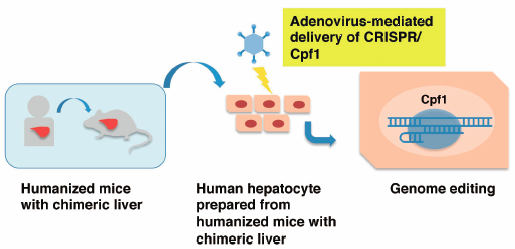- 著者
- Tomohito Tsukamoto Eiko Sakai Shunsuke Iizuka Marcos Taracena-Gándara Fuminori Sakurai Hiroyuki Mizuguchi
- 出版者
- The Pharmaceutical Society of Japan
- 雑誌
- Biological and Pharmaceutical Bulletin (ISSN:09186158)
- 巻号頁・発行日
- vol.41, no.7, pp.1089-1095, 2018-07-01 (Released:2018-07-01)
- 参考文献数
- 37
- 被引用文献数
- 16
The clustered regularly interspaced short palindromic repeats (CRISPR)/CRISPR-associated protein (Cas) 9 system is now widely used as a genome editing tool. CRISPR-associated endonuclease in Prevotella and Francisella 1 (Cpf1) is a recently discovered Cas endonuclease that is designable and highly specific with efficiencies comparable to those of Cas9. Here we generated the adenovirus (Ad) vector carrying an Acidaminococcus sp. Cpf1 (AsCpf1) expression cassette (Ad-AsCpf1) for the first time. Ad-AsCpf1 was applied to primary human hepatocytes prepared from humanized mice with chimeric liver in combination with the Ad vector expressing the guide RNA (gRNA) directed to the Adeno-associated virus integration site 1 (AAVS1) region. The mutation rates were estimated by T7 endonuclease I assay around 12% of insertion/deletion (indel). Furthermore, the transduced human hepatocytes were viable (ca. 60%) at two weeks post transduction. These observations suggest that the Ad vector-mediated delivery of the CRISPR/AsCpf1 system provides a useful tool for genome manipulation of human hepatocytes.
